How AI in Software Testing is Revolutionizing Quality Assurance
Table Of Content
Published Date :
02 Jul 2025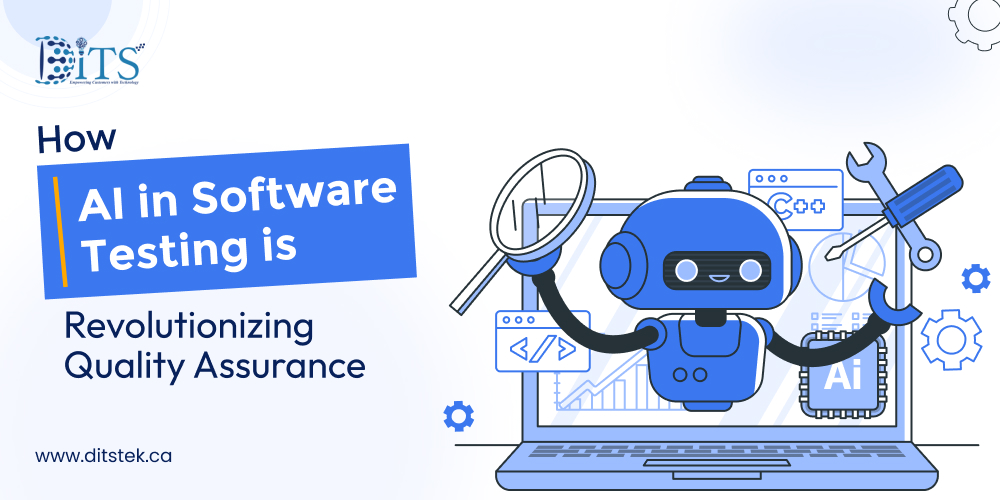
Testing is an essential process every software development company uses to deliver high-quality solutions. It's a long process that requires the detection of errors, bugs, and other things that are not up to the mark. Any errors and bugs are rectified, and the software is tested repeatedly to ensure a clean solution that works as required. The process of testing takes time, effort, and patience. However, quality testers need to face a lot of challenges, such as working on repetitive tasks, meeting deadlines, and the risk of human errors.
This is where AI in software testing kicks in. Artificial intelligence tools help quality testing teams automate repetitive tasks and detect bugs and errors quickly, making the entire process much faster and more efficient. By automating repetitive tasks, AI tools free up testers to focus on more complex tasks that need human intervention. Let us explore how AI in software testing helps developers make testing fast and efficient.
What is AI Testing?
AI testing is the process that involves the use of AI tools to test a software product for errors, bugs, capabilities, reliability, and efficiency. AI testing aims to improve and streamline the testing process and make it faster and more efficient for QA testers. AI testing helps testers identify any errors quickly and test any software's capability and reliability to ensure it works as intended before the final deployment or launch for end users.
Supercharge Your Testing with AI!
Manual testing slowing you down? Say goodbye to resource-heavy processes, human error, limited test coverage, and scalability bottlenecks with AI testing.
Challenges of Conventional Manual Testing
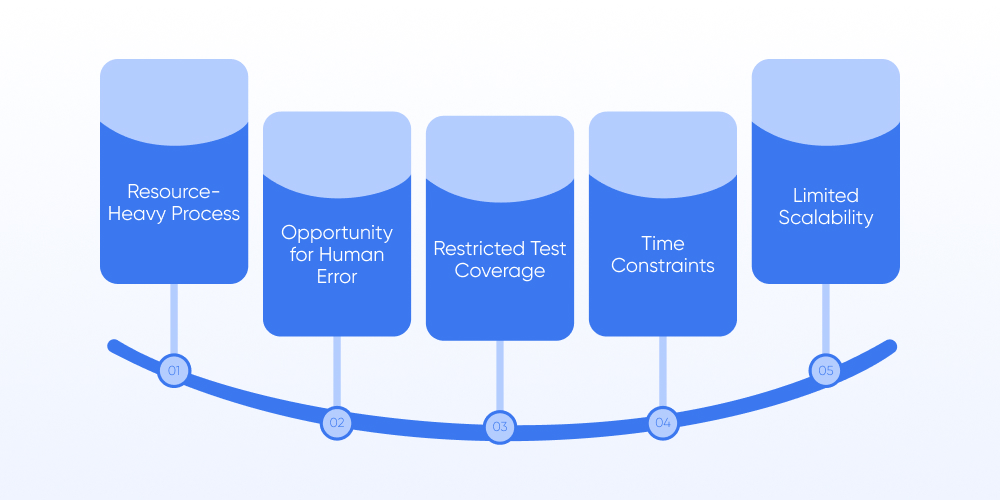
Despite its long-standing role in quality psychology, manual testing has some drawbacks that limit its efficiency and scalability. This is especially problematic in fast-paced development cycles.
Resource-Heavy Process
Manual testing demands significant human effort and time. This dependence on manual testing slows release cycles as applications scale or updates become frequent, putting pressure on the testing teams.
Opportunity for Human Error
Even experts can miss bugs, overlook edge cases, or misinterpret the expected behavior. This leads to fallout: inconsistent results, unreliable coverage, and risks to quality.
Restricted Test Coverage
There is often a scenario coverage reduction for manual efforts covering actual implementation situations. Hence, edge cases and complicated user paths are left under-tested, leaving room for issues-free.
Time Constraints
Manual testing remains one slow means of doing a job. When running on deadlines, teams have to either make a choice on coverage or depth that further goes on to cripple the stability of the actual product.
Limited Scalability
As digital systems grow in complexity, scaling manual testing without implementing cost reductions becomes entirely infeasible, with redevelopment at a lesser cost and/or team sizing included. Hence, automation is Agassi, and luxury is not.
Rise of AI in Automation Testing
AI changes the way software testing is approached. It's no longer just about the speed; it's about smarter testing. On the contrary, AI testing will offer test teams greater accuracy, reduced turnaround time, and better product quality.
These tools allow ingestion and analysis of massive data sets, pattern recognition, and prediction of occurrences regarding where a failure can most likely happen. They can also optimize test cases in real time and update them to relieve testers of monotonous tasks. With that freedom, QA teams will focus on exploratory testing and high-priority scenarios where human insight is indispensable.
In addition, AI-learning algorithms can learn from history and help prioritize test execution in terms of risk, impact, and recent changes! In contrast, manual automation mechanisms find this very difficult.
How AI Supports Smarter Testing Workflows
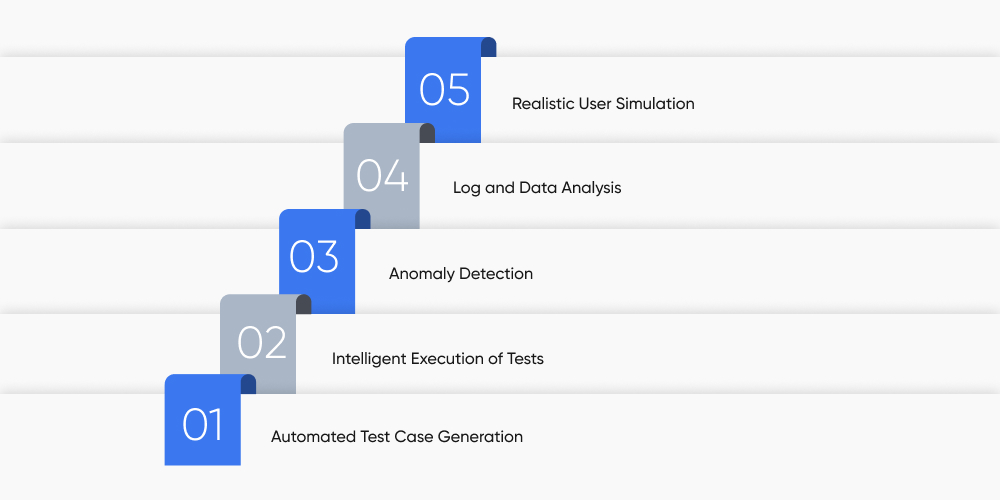
AI supports testing workflows in multiple ways. From automated test case generation to realistic user simulation AI does it all with high speed and accuracy.
1. Automated Test Case Generation
This AI auto-generates test cases analyzing the application behavior and patterns of users, thus covering areas which might never occur to manual testers. It helps in creating stronger test scenarios, including edge cases, which are much closer to the real user journey.
2. Intelligent Execution of Tests
Following risk-based prioritization, the AI optimizes the suite of test cases, evaluating the test cases of greatest importance in the given build, which speeds up the execution and narrows its scope.
3. Anomaly Detection
Being capable of pattern recognition, an AI can report early behavior deviations. Hence, defects could be detected earlier-the ones that do not follow a predetermined path-until they emerge into bigger problems.
4. Log and Data Analysis
With AI-powered applications analyzing copious amounts of log files, whatever performance issues, secretly errors or trends that could moto be noticed by the naked eye during a manual review, can be detected. This translates into quicker root cause analyses and better debugging.
5. Realistic User Simulation
AI simulates complex user interactions that vary across devices, networks, and environments. This provides a more reliable testing of user experience, response time, and system reliability.
Future-Proof Your QA with AI Testing!
Why settle for slower, risk-prone testing? DITS empowers your QA process with AI-driven test creation, intelligent execution, anomaly detection, and deep data analysis.
Benefits of AI Testing Automation
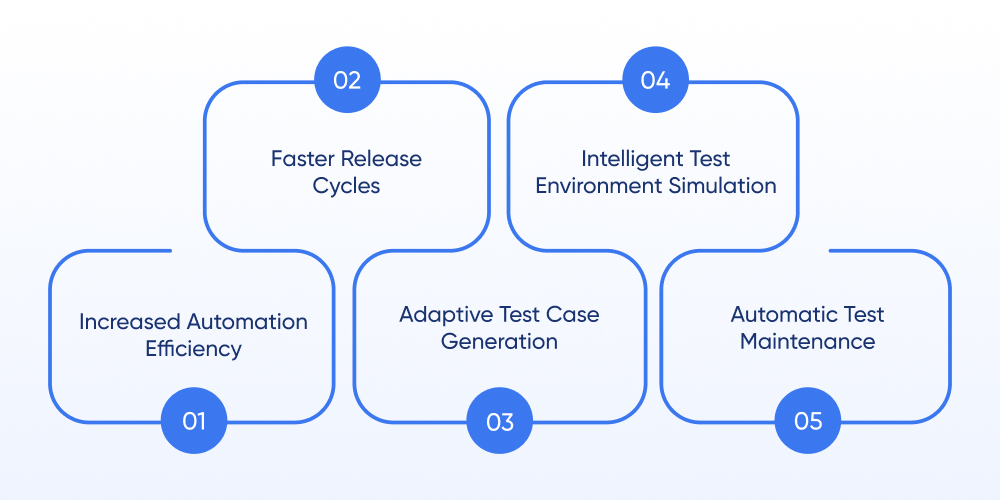
AI does not just automate the testing life cycle - it enhances the entire testing life cycle. Here are a few different modalities:
1. Increased Automation Efficiency
AI based technology learns from all the past executions of the automation to keep improving test coverage and accuracy. So you are left with fewer, smarter tests that scale, minimizing false positives.
2. Faster Release Cycles
AI is identifying and zooming in on the important areas that are impacted and allowing teams to discover and remediate the important bugs much faster. Now teams can release with confidence without sacrificing quality and/or release timeline.
3. Adaptive Test Case Generation
Test cases are presented as dynamic virtual representations that utilize the AI capability to automatically adjust the test cases every time the application is modified. AI will lessen scripted test maintenance and will ensure tests are up-to-date with every code change.
4. Intelligent Test Environment Simulation
With AI powered machine learning models, you can simulate complex conditions and multiple user paths, enabling you to analyze application behavior despite not having any real world infrastructure.
5. Automatic Test Maintenance
The AI will monitor all the code changes in your code repository, automatically adjusting all affected test scripts, this reduces human error and ensures that the tests continue to be reflective of the context over time.
AI Testing Use Cases
Artificial intelligence is already helping software developers in many ways. Let's explore some use cases of AI in software testing.
Low Code Testing
AI helps in using low-code automation tools to make testing easily accessible to non-technical users. Using low-code automation tools, non-technical users can generate tests by simply demonstrating the steps for testing on a mobile device. AI will create a reusable testing script that users can run on multiple devices. AI can create low-code tools, which helps QA testers and organizations extend their ability to test software solutions.
Predictive Analysis and Maintenance Testing
Keeping up with test script updates can be challenging for QA testers. AI helps testers find patterns in large data sets, analyze code modifications, and adjust test cases to adapt to those changes.
AI identifies the code's most vulnerable areas to bugs and suggests where the testing should be increased. This predictive mechanism allows the QA team to find failures run early on, which can greatly reduce the number of issues in production and help ensure we deliver a better overall experience to the user.
Automated Test Case Creation
Writing test cases from scratch has never been easy; it has always been slow and repetitive. AI changes that. AI can automatically create relevant test cases by ingesting and understanding business requirement documents, application code, and user stories. Think of the time savings and added coverage! Plus, AI will find potential edge cases that, most likely, would not have been discovered with manual testing, helping to make our QA efforts an overall more robust process.
Smarter Test Case Prioritization
AI also takes the guesswork out of deciding the order in which to run test cases. By utilizing historical defect data, the level of risk, and the level of criticality for a feature, AI can help the QA team prioritize their test cases. This ensures that the testing cycles are focused on the most important areas first and allows better opportunities to find defects early. It also removes the risk of critical bugs being missed.
Redefine Quality Assurance with AI Testing by DITS!
Say goodbye to fragile scripts, delayed releases, and endless test maintenance. DITS leverages AI to supercharge your entire testing lifecycle.
How DITS can help with AI for Software Testing
At DITS, we help businesses with AI-powered software testing practices tailored to their project requirements. Our team merges an extensive level of QA expertise with intelligent automation so that you can start streamlining generated test cases or coverage in high-risk areas and provide predictability by leveraging real-time data.
By utilizing AI for software testing, we help our clients shift defect burden upstream by testing earlier and lessening manual effort while delivering fast, predictable releases without sacrificing quality. If you need faster time to market or more test coverage, we have the right AI-based framework that scales with your application.
Secure a partnership with DITS to reap the benefits of our innovative AI solutions as you modernize your QA processes to ensure you stay ahead in the competitive tech environment.
Conclusion
AI is no longer the future of software testing, as most businesses are already using AI for quality assurance. From speed and accuracy improvements in testing to predicting defects before they happen, AI allows for a stronger and smarter partnership that drives results, meaning you can deliver even more value.
As software development evolves and complexity increases, you want to use every advantage of AI in your QA process to drive further performance and customer satisfaction. At DITS, we leverage industry-leading AI tools with robust and proven QA practices for businesses fully committed to transforming their testing process. Are you ready to protect your future and build the right quality assurance approach? Let's build together intelligent software solutions to help businesses improve operational efficiency, save time and effort, and increase revenue.
FAQs
1. In what ways can AI help increase the efficiency of software testing?
AI increases efficiency by automating rote work such as test case generation, test execution, and test prioritization. AI analyzes large sets of data and identifies high-risk areas enabling testers to focus their most precious resource, their time, on the highest risk verbal validation and removing labor from manual test execution, allowing rapid release.
2. Will AI replace manual testing?
No, AI is designed to augment and not replace manual testing. While AI performs the repetitive, data-driven work extremely well, human testers can still offer exploratory, usability assessments, and testing that demands judgment and understanding of a domain.
3. What types of AI techniques do you use in software testing?
At Ditstek Innovations, we use natural language processing methods to generate test cases, and using pattern recognition techniques for visual testing. In complex testing, AI will facilitate improved accuracy and the ability to adapt.
4. How can DITS implement AI into my testing process?
DITS developers will collaborate with you to deploy artificial intelligence (AI) across the Quality Assurance (QA) workflow. Our customized/flexible solutions will combine intelligent test automation with a predictive analysis function, to identify and capture defects sooner, deploying quality software quicker.

Dinesh Thakur
21+ years of IT software development experience in different domains like Business Automation, Healthcare, Retail, Workflow automation, Transportation and logistics, Compliance, Risk Mitigation, POS, etc. Hands-on experience in dealing with overseas clients and providing them with an apt solution to their business needs.
Recent Posts

Digital transformation in healthcare streamlines operations, reduces administrative waste, strengthens revenue cycles, and enables data-driven decisions that support sustainable cost control and improved care delivery.
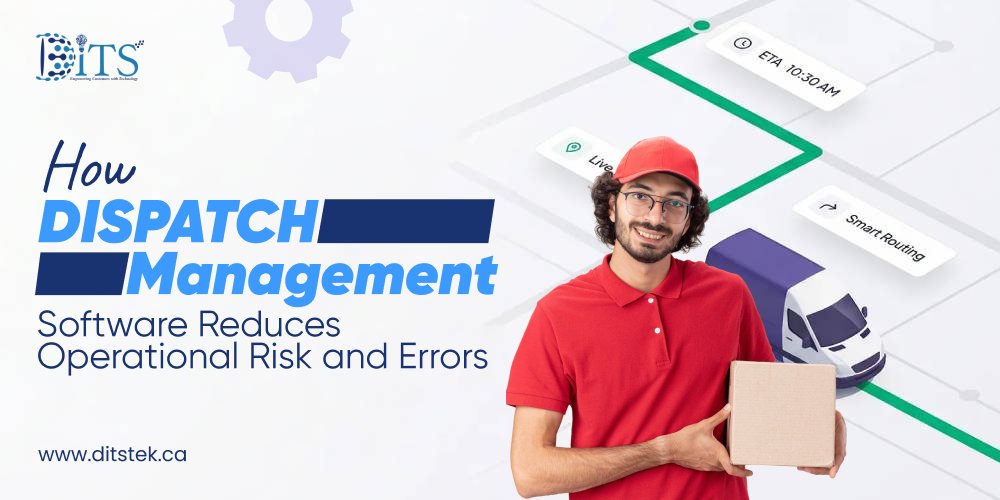
Reduce operational risks and errors by replacing manual, spreadsheet-based processes with dispatch management software.
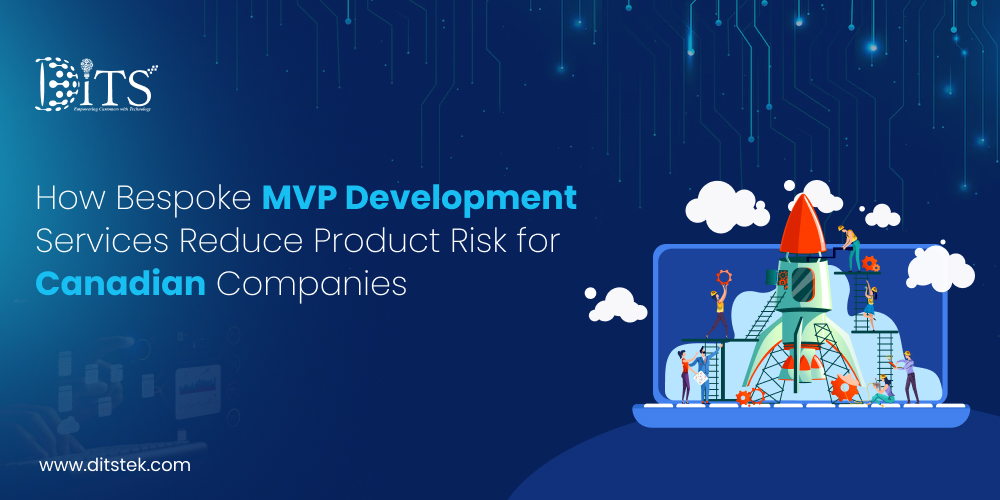
Discover how bespoke MVP development services help Canadian companies reduce product risk, validate ideas faster, and build scalable products with confidence.